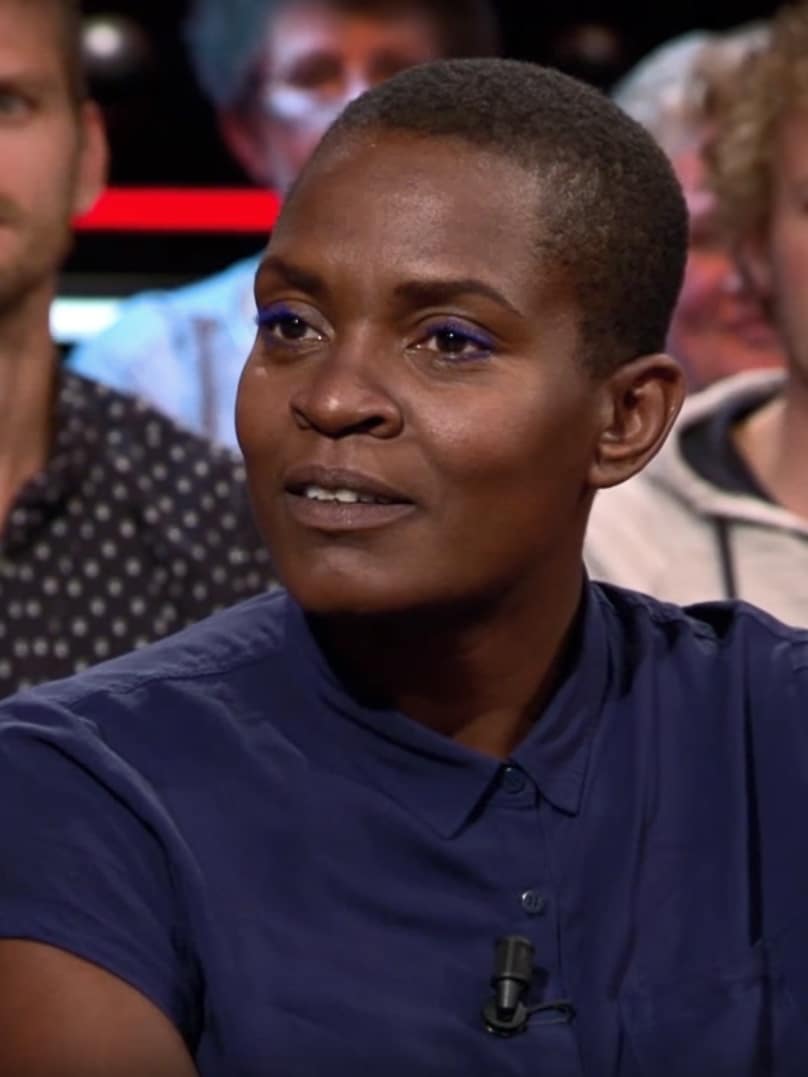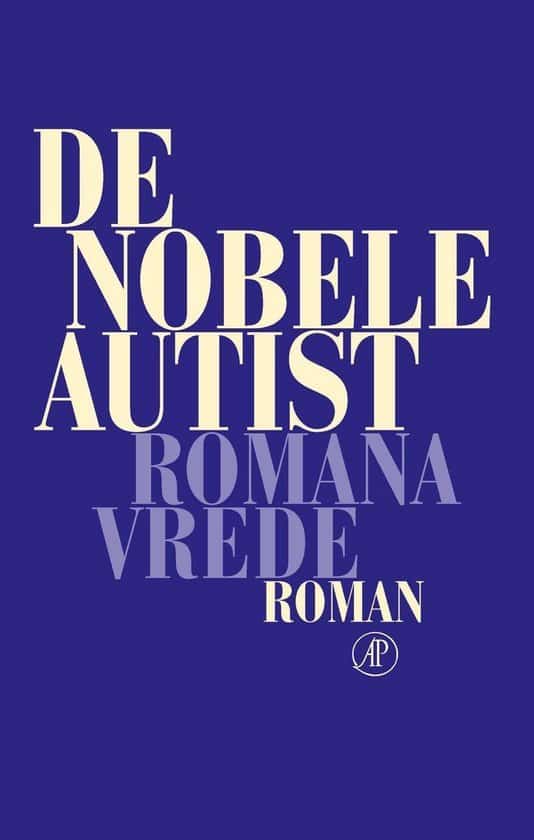‘De Nobele Autist’ by Romana Vrede: Boundless Love for a Clever Brat
A teenage son with autism and learning difficulties receives a letter from his mother. Penned by Dutch actress Romana Vrede this results in a surprising book, as hard-hitting as it is loving and candid.
Enough books have been written about a parent, often when the parent in question is about to leave this earth. A parent who writes a letter to a child, trying to explain the world in which he or she grows up, has also been done, only just a few years ago by Abdelkader Benali.
 Romana Vrede
Romana Vrede© Wikipedia
The basis of De Nobele Autist (The Noble Autist), the debut novel by Romana Vrede, is therefore not very unique, except that the son to whom the letter is addressed is not only severely autistic but also has learning difficulties. The chance is incredibly slim that he will ever read the letter himself. And the public may already know about the autism of her adolescent son Charlie. Romana Vrede previously acted in the theatre production Who is afraid of Charlie Stevens?, and in 2019 she made an acclaimed documentary about children with autism, Dit is de leven (This is life).
What more could be added to that? A lot, it turns out. By starting with Charlie’s fictional death, Vrede takes an original approach to her letter. ‘I don’t think I’ll be there, and that breaks my heart… As a child, you need your mother in all big moments, and death is a big moment, and you remain a child.’ The fear that she won’t be there when he most needs her runs through the book, often resulting in heart-wrenching passages, brimming with love for that extraordinary child.
However, it was not love at first sight for Romana and Charlie. She recounts how as a new-born he does not seem to recognise her, resembles ‘a robot in standby mode’, how as a toddler he can be a brat, and how they subsequently become ‘a special case’ in hospitals, a difficult one that requires further investigation.
While Vrede discovers that her son is ’different’, she also discovers what kind of mother she is. She admits that she sometimes feels ashamed, not of him but of herself, because she does not stand up for him enough. People utter the crudest insults, or are just rude and mean. Like the woman who requests a roster for the sandpit, because her children are afraid of Charlie. Vrede mentions the incident in a series of angry letters grouped under the heading ‘to those I have yet to forgive’, one of the many devices that make this book so compelling and unusual.
Vrede’s reflections lend the book a philosophical slant that is much broader than Charlie’s life alone
Another innovation are the footnotes accompanying the letter, in which Charlie fictionally responds to his mother’s concerns from his deathbed. Sometimes uncomprehending, how could it be otherwise, but equally smart, original, witty, and always loving. Because that after all is his superpower: everyone feels at home with Charlie, because he gives such infinite love. That’s just one of the things we can learn from him.
After those first difficult years, Romana and Charlie have become very close. The way she describes how as a six-year-old he teaches her confidence is extraordinary. Because this is not just an account of life with an autistic son. Vrede has turned it into a proper novel, shaped the story to her will, and she does so in lively language, where anger and disbelief sometimes gain the upper hand, but wonder and especially boundless love also prevail. Yet Vrede’s writing style is never cloying or sickly sweet, there is no room for false sentiment in this book.

She fantasizes about what his life has been like, and asks important questions about his experiences. Her contemplations lend the book a philosophical touch that reaches beyond Charlie’s life. Because thanks to him she has learned so much. About how we can live together despite all our differences. How we must try to keep the dialogue going, even if we have difficulty understanding each other. How to learn to see each other’s talents instead of each other’s flaws, even when the latter are more in evidence. To emphasize this universality, Vrede sprinkles her text with quotes from plays in which she has acted, by Hendrik Ibsen, Friedrich Nietzsche, and Molière, and also by contemporary, sensitive writers like Jeroen Olyslaegers and Judith Herzberg.
All this culminates in a gripping, cinematic finale that reads like a kind of mantra, an attempt to cast a protective charm around Charlie’s life. The life of a noble man, as chronicled by a mother with the heart of a lion whose love for her son knows no bounds.
Excerpts from ‘De Nobele Autist’, as translated by Paul Vincent
Excerpt 1 – pp. 25-26
How were you born?
You were going to be big, strong and healthy. We had already seen that on the ultrasound.
The birth was bearable until it came to the pushing. Everything tore. When you were laid on my breast I was completely exhausted. I thought that was the reason, because I did not feel any contact at first.
The first night in the hospital I went looking for you. They were to bring you every three hours for a feed. I woke at three in the morning, after I had fed you at eleven, so I climbed out of my hospital bed and waddled towards you, as if trying furtively to check the presents under the Christmas tree. Further down the corridor was the ward for new babies, I looked into the cots of other babies, who were sleeping or dozing, and then I found you and I had a fright. Your eyes were wide open and you looked at me without really looking at me. You looked right through me. I did not know what to do. I smiled at you; no response, not even bewilderment. It made me feel uncertain, and with a frozen smile on my face I withdrew from your field of vision. It was like a comic act: if only I moved slowly, you would not see me.
The situation was and still is alienating in my memory. I who do not pick you up, you who just register me. Do other babies recognise their mother at once? What do ordinary mothers do at such a moment? Slowly I crept back to my bed. A quarter of an hour later you were brought by the midwife for feeding. Looking back I suspect she saw me creeping about on the closed-circuit cameras. Perhaps that section of film still exists and is stored somewhere. Then I’ll be able to see whether my memory is right.
When you were born, at the moment you came out of me, it felt as if a fist were passing through a keyhole, or simply a baby through a vagina. I must push, they said. ‘That’s right,’ they said. No, no, that wasn’t going to work, I thought. It wasn’t right. ‘Again! Keep going!’ they shouted. If I did what they wanted, I thought, it would be the death of me. I would die. My life for your life. Then I said goodbye to who I was. I had to push. That was it. This was life. It was beautiful. I was allowed to live this long. Just turned thirty. It had really been a beautiful life, no regrets.
They asked your father if he wanted a look. We cried in chorus: ‘No!’ I because while I was going to die, I wanted it to be with some decorum, I thought. He because he did not need to see the war zone down below, that battlefield. After six pushes you were there. Too big and too hairy.
I was content, happy, fulfilled. It was good as it was. Then and there I had everything I wanted, but not, it turned out later, in a way I could have suspected. My Sunday life stopped, a day presented itself that had not yet occurred in our week. A great day. A jubilee day, like you have a jubilee year. Everything I thought I knew ceased to exist. [1]
[1]
I am born, and everything is brightly lit.
I seem congealed and no longer fluid. In my belly, down my throat, in my mouth, sweet goodness now flows. Then I fly on other hands through a space that is too chilly, cold air around my buttocks.
Excerpt 2 – pp. 49-50
In the playground I was ashamed when you wanted to go off with a man who was a total stranger and not with me. You were two or three, and we were playing in the sandpit. A man as old as your father was also playing there with his daughter. He took you from me, as you had stretched out your arms to him. You reached out to him and wanted him to lift you up, and so he did. Well-meaning. You turned your head away from me and looked in the direction of the street, as if the two of you would go that way. He thought you were lovely, but I felt: this is not right.
When I tried to take you from him, you cried. You wanted to go with him. You thought he was your Daddy. You rejected me completely, not only as a mother, but even as someone you knew. What must the man think of me? What a worthless mother is that, for her child not even to want to be with her. He still thought you were lovely, and I laughed a cowardly laugh. Again he tried to give you back, but you still did not want to. I saw how he looked when he had to unpick your arms from his neck and you cried because you wanted to stay with him. A splendid portrait, that is how it is etched in my memory. In his eyes I read pity, a question and a hint of disgust.
I don’t know if you are sometimes ashamed. I have noticed that in the Oceanium, the underground aquarium where everyone focuses on the bellies of the sharks and the mouths of the starfish, you sit quietly despite the hullabaloo. Fathers and daughters scream as loudly as each other, mothers push empty buggies, little brothers bang on the thick glass with their rattles, and you sit still as if you are in a forest. Usually you attract looks of alarm, fear, anger, aggression or disgust when you jump and sing and hum in a public space. Now you are protected by the beauty of the fishes and the marine animals. The looks you attract when there are no fish, do you feel them? Do they hurt? Does it get through to you when people look at you like that, when their first reaction is to be frightened of you?
Romana Vrede, De nobele autist, De Arbeiderspers, Amsterdam, 204 pp.












